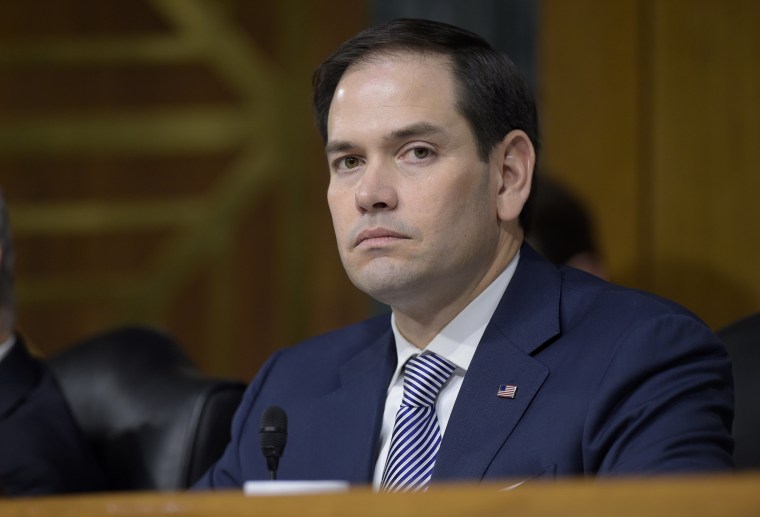WASHINGTON — Sen. Marco Rubio gave the GOP tax bill a big boost Friday after announcing his support in response to late changes to its child tax credit and another key Republican also said he was jumping on board — support that solidifies chances for passage.
Rubio, R-Fla., had initially come out against the bill on Thursday over reports that the House-Senate deal would include a deeper tax cut for Americans making over $500,000, while leaving out his proposal to expand tax credits for low-income families.
Negotiators quickly worked to partially meet his demands. Rep. Kristi Noem, R-S.D., a member of the House negotiating team, said that to satisfy Rubio the plan would now make $1,400 of the $2,000 child tax credit refundable instead of $1,100 in the original draft.
The tweak was enough for Rubio, who announced his support for the changes on Twitter.
READ: The full GOP tax bill
In addition, Sen. Bob Corker, R-Tenn. — who had been the sole vote against the initial Senate bill, citing deficit concerns — also announced his support for the GOP plan on Friday.
"This bill is far from perfect...(b)ut after great thought and consideration, I believe that this once-in-a-generation opportunity to make U.S. businesses domestically more productive and internationally more competitive is one we should not miss," he said in a statement.
According to a summary sheet provided to House Republicans, the new tax bill cuts the corporate tax rate from 35 percent to 21 percent while taxing foreign earnings at lower rates, a change from the current system in which companies can defer taxation by keeping their profits abroad.
"This is the first major tax reform in a generation," said House Speaker Paul Ryan, R-Wis. "This is what the American people have been waiting for: More jobs, fairer taxes and bigger paychecks."
Senate Majority Leader Mitch McConnell, R-Ky., said, "China is already worried about this tax bill, because they know it will make America more competitive and spur greater investment here in America."
Businesses organized as pass-through can take a 20 percent deduction, with some restrictions on businesses earning income over $315,000. Tax experts are concerned the new pass-through deduction creates an incentive for more individuals to identify themselves as a business in order to claim it.
On the individual side, the maintains seven tax brackets while lowering tax rates, with a top rate of 37 percent down from 39.6 percent under current law, and changing some income thresholds.
It scales back or eliminates a variety of deductions and tax benefits, including a new $10,000 cap on the state and local tax deduction and a $750,000 cap on the mortgage interest deduction for new home sales. Nonpartisan estimates of the previous House and Senate bills have found the biggest gains on the individual side go to the richest taxpayers.
Like the Senate bill, the final version eliminates the Affordable Care Act's individual mandate, which requires people to maintain health coverage or pay a penalty. The Congressional Budget Office predicts the change will cause 13 million fewer people have insurance after a decade and raise individual premiums by 10 percent annually.
The bill would double the estate tax threshold from its current starting point of $5.5 million, allowing more wealthy heirs to avoid the tax. But, unlike the House bill, it would not be eliminated entirely.
Votes are planned next week, possibly as early as Tuesday.
While the House seems on track to pass tax legislation, Republicans face a tighter margin in the Senate. No Democrats are expected to back the final bill, with members overwhelmingly critical of the previous version's $1.5 trillion cost and emphasis on tax breaks for higher incomes.
The revised bill would increase the deficit by $1.45 trillion over 10 years, just under the $1.5 trillion threshold allowed under the reconciliation procedure that Congress is using to try and pass the bill, according to estimates by the Congressional Budget Office and Joint Committee on Taxation released Friday.
"Under this bill the working class, middle class and upper middle class get skewered while the rich and wealthy corporations make out like bandits," Senate Minority Leader Sen. Chuck Schumer, D-N.Y., said in a statement Friday night. "It is just the opposite of what America needs, and Republicans will rue the day they pass this."
Republicans can only afford to lose two of their members or the bill won't pass.
Republicans face a tight deadline to vote before newly elected Democrat Doug Jones takes office, replacing Sen Luther Strange, R-Ala. Democrats have demanded Republicans wait until Jones is seated after his win over Roy Moore, citing similar requests from Republicans that they honored after former Sen. Scott Brown, R-Mass., won a special election during the debate over health care reform.

